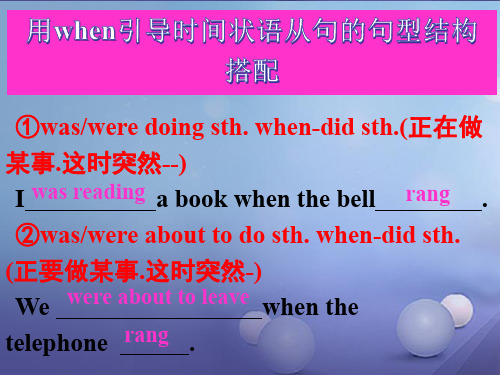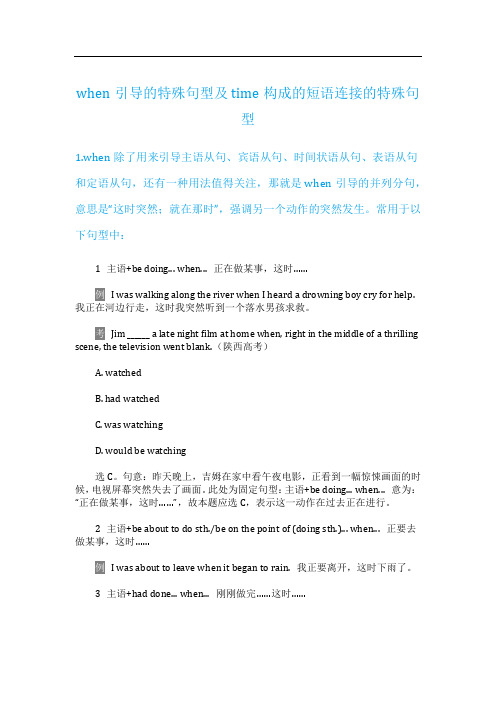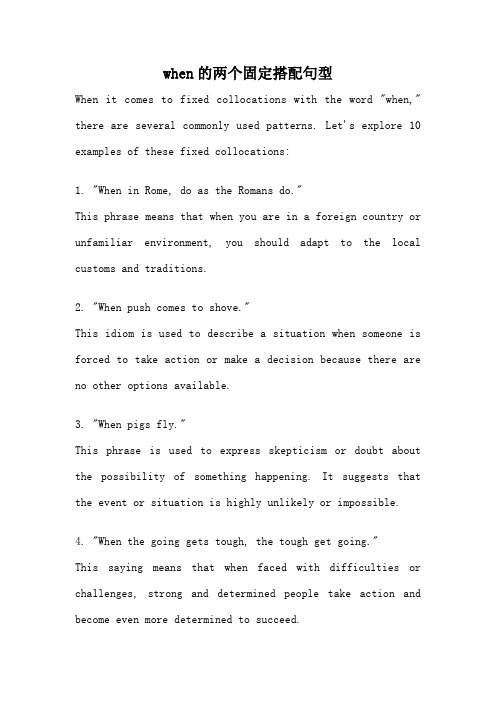When...的句型
it is when句型用法

it is when句型用法
"When"句型是指以"when"引导的从句。
它用来描述一个事件
发生的时间点或条件。
1. 时间点:当从句表示一个特定的时间点时,主句和从句中的动作发生时间是一致的。
例如:
- When did you arrive at the party?(你什么时候到达派对的?)- I will call you when I finish work.(我下班后会给你打电话。
)
2. 条件:当从句表示一个条件时,主句和从句中的动作在时间上可能不一致。
例如:
- I will be happy when I pass the exam.(我通过考试时会很开心。
)
- When it rains, I always stay indoors.(下雨时我总是呆在室内。
)
需要注意的是,当从句表示的时间是将来时,主句使用的一般将来时态,而从句则使用一般现在时态。
例如:"I will call you when I arrive"(当我到达时,我会给你打电话。
)。
when-before-since区别及用法

storm started.
AA.. wwhen
B. while C. until
D. before
2. (02上海) He was about to tell me the secret ______ someone
patted him on the shoulder.
A. as
B. until
C. while D. whheenn
when,before,since句型归纳
1、when 句型: (1) be doing sth…when…
He was still smiling when the door opened and his wife came in.
他正笑着的时候门突然开了,他妻子走了进来 。
(2) be about to do sth…when… We were about to start when it began to rain. 我们刚要出发,天就开始下雨了。
It is 5 years since he left Beijing . 他离开北京5年了
It has been 3 years since he came back from abroad.自从他回国已经三年了
3.since句型
It is/has been+时间段+since sb. did… §②§did动作为持续动词(延续性),翻译为 自从不做某事有多长时间
(4)hardly /sceracely…when… (一…就…) He had not/hardly/scarcely fallen asleep when the telephone rang. 他刚要入睡电话就响了。
We had scarcely arrived when he asked us to leave. 我们才刚刚到他就叫我们走了.
用when引导时间状语从句的句型结构搭配

⑥It the first/second/third-time+ that did / had\have\ has + done 结构中,that-从句通常用过去完成时,有时也用一 般过去时,有时若有包括现在在内的时间状语,偶尔还可用 现在完成时:
I was lucky because that was the second time I(had) visited Japan that year.我很幸运,那是我那年第二次访问日本.
I was about to go out when it began to rain.
2.我正在做作业他就打电话给我。
I was doing my homework when he phoned me.
3.他一到学校就下雨。
No sooner had he got to school had he got to school when it began to rain. He had no sooner got to school than it began to rain.
It was the first time this year that hhe adn’t [hasn’t] work on a Saturday.这是今年来他第一次在星期六不上班.
(完整word版)when,since,before,that句型

It+be+ ⋯⋯ +that/since/before/when 用法辨析1. it was+ ( 时刻,或时间点) + when sth. happened. 当某事发生时,是几点钟或哪一年如:It was 1997 when Hongkong returned to China.It was five o'clock when we arrived at the small mountain village.对比强调句型: It was at five o'clock that we arrived at the small mountain village.It+ is/ was+ ⋯+that ⋯多用于强调。
判断方法如下:去掉 it 、be 和 that ,余下的部分仍是一个完整的句子,这样的句子一定是强调句。
2. it was+ 一段时间 + before sth happened.过了一段时间之后,某事才发生了。
如:it was two years before Macao returned to China.it will be +一段时间before sth. happens.要过一段时间之后,某事才会发生。
或不用过多久,某些就将发生:it won't be long before sth. happens.It won ’t be long before you see him again.没过多久就⋯It was long before they escaped from the prison.过了很久才⋯.3.it is (=has been)+ 一段时间 since sth. happened. 自某事发生以来,(时间)已经过去。
了。
如: It is 11 years since Hongkong returned to China. 香港回归已经有11 年了。
新东方高中英语必备句型使用、例子及考点-when引导的特殊句型及time构成的短语连接的特殊句型

when引导的特殊句型及time构成的短语连接的特殊句型1.when除了用来引导主语从句、宾语从句、时间状语从句、表语从句和定语从句,还有一种用法值得关注,那就是when引导的并列分句,意思是“这时突然;就在那时”,强调另一个动作的突然发生。
常用于以下句型中:1 主语+be doing... when... 正在做某事,这时……I was walking along the river when I heard a drowning boy cry for help. 我正在河边行走,这时我突然听到一个落水男孩求救。
Jim ______ a late night film at home when, right in the middle of a thrilling scene, the television went blank.(陕西高考)A. watchedB. had watchedC. was watchingD. would be watching选C。
句意:昨天晚上,吉姆在家中看午夜电影,正看到一幅惊悚画面的时候,电视屏幕突然失去了画面。
此处为固定句型:主语+be doing... when... 意为:“正在做某事,这时……”,故本题应选C,表示这一动作在过去正在进行。
2 主语+be about to do sth./be on the point of (doing sth.)... when... 正要去做某事,这时……I was about to leave when it began to rain. 我正要离开,这时下雨了。
3 主语+had done... when... 刚刚做完……这时……I had just finished my exam paper when the bell rang announcing the class was over. 我刚完成试卷,这时下课铃响了。
when的两个固定搭配句型

when的两个固定搭配句型When it comes to fixed collocations with the word "when," there are several commonly used patterns. Let's explore 10 examples of these fixed collocations:1. "When in Rome, do as the Romans do."This phrase means that when you are in a foreign country or unfamiliar environment, you should adapt to the local customs and traditions.2. "When push comes to shove."This idiom is used to describe a situation when someone is forced to take action or make a decision because there are no other options available.3. "When pigs fly."This phrase is used to express skepticism or doubt about the possibility of something happening. It suggests that the event or situation is highly unlikely or impossible.4. "When the going gets tough, the tough get going."This saying means that when faced with difficulties or challenges, strong and determined people take action and become even more determined to succeed.5. "When all is said and done."This expression is used to summarize or conclude a discussion or argument by emphasizing that despite all the words or actions, the final result or outcome is what truly matters.6. "When the cat's away, the mice will play."This proverbial phrase means that when someone in authority is not present, those under their control will take advantage of the situation and behave in a more relaxed or irresponsible manner.7. "When one door closes, another one opens."This saying suggests that when one opportunity or option is no longer available, another one will arise. It encourages optimism and a positive outlook on life.8. "When in doubt, do nothing."This phrase advises caution and suggests that if you are unsure or hesitant about a decision, it is better to refrain from taking any action until you have more information or clarity.9. "When the cat's in, the mice won't play."This proverbial phrase is the opposite of number 6 above. It means that when someone in authority is present, those under their control will behave more cautiously or obediently.10. "When the clock strikes twelve."This phrase refers to the moment when the hour hand of a clock reaches twelve, marking the beginning or end of an event, deadline, or specific time period.These fixed collocations with "when" are commonly used in everyday language and can greatly enhance your understanding and communication skills in English.。
when的用法大盘..
when的用法大盘点余明朝陕西省商南县高级中学When看似简单,也并不陌生,但词性较多,用法较多。
在中小学英语教学中具有基础性的作用。
与when相关的考试题目也经常出现在各级各类考试中。
因此,学习和掌握when 的各种用法至关重要。
下面就when的基本用法、特殊用法和易混形式进行盘点,供复习备考之用。
一、When的基本用法1.When用作疑问副词引导特殊疑问句。
例如:When does the film start?When will they come?2.when用作关系副词引导定语从句。
When在定语从句中作时间状语,起连接作用。
例如:Spring is the time when the antelopes move.The day when the killing stops will be a happy day.Since 1995, when it was created, the Wildlife Crime Unit has tried to explain to shopkeepers the reasons why animals must be protected.Occasions are quite rare when I have the time to spend a day with kids.(间隔定语从句)3.when用作连接副词引导名词性从句,包括主语从句、宾语从句、表语从句和同位语从句:When she will attend the meeting is not decided.(主语从句)That is when the film will begin.(表语从句)The only time I felt worried was when we went into a forest in which snakes live. (表语从句)I wonder when she was here.(宾语从句)I have no idea when he will be back.(同位语从句)4.When用作从属连词,用来连接时间状语从句,可放在主句前或后或中间。
when引导的特殊句
When引导的特殊疑问句1.When is your birthday? 你的生日是什么时候?When is your birthday? 你的生日是什么时候?My birthday is June fourth. (It’s on June fourth)我的生日是六月四号。
When is your mother's birthday? 你妈妈的生日是什么时候?When is one's birthday?是询问某人生日的句型;若问某人何时出生,则用句型When was /were…born?When is your birthday, John? 约翰,你什么时候过生日?When were you born, John? 约翰,你什么时候出生的?2. My birthday is June fourth.(1)birthday 名词,意思是―生日‖,它是一个合成词,是由名词birth和名词day组成的。
(2)当别人问When is your birthday时,我们可以回答My birthday is …也可以用It's on June fourth.当日期具体到某一天时要用介词on, on在此句中可以省略。
如果只是说在哪个月,或哪一年时,介词用in.(这一点要格外注意,具体到某天用on,某月某年用in,这点经常考到)My birthday is (on)October tenth.我的生日在十月十号。
Tree Planting Day is in March.植树节是在三月。
3. Date of birth.(1)birth名词,意思是―出生;出世;诞生‖(2)date名词,意思是―日期‖,指―几月几号‖.What's the date today?今天几月几号?4. How old are you?此句的意思是―你多大了?/多大年龄‖,how old对年龄提问,回答时常用句型―I'm+数词‖或―I'm…years old‖.【单元语法】一,序数词序数词是表示数目顺序的词,一般翻译为―第几‖,其构成如下:①第1至第3独立成词:第1 first , 第2 second, 第三third.(第一第二第三比较特殊,用的最多,考的也最多)它们都有缩写形式,1st, 2nd, 3rd②第4到第19是在基数词的基础上加后缀-th.(注意一些特殊的情况)如:第4 fourth, 第5 fifth, 第6 sixth,第11 eleventh,第18 eighth它们的缩写形式一般在阿拉伯数字后加后缀-th构成。
when的十种用法
when的十种用法when有一下十种用法:1. 引导时间状语从句从句中的谓语动词既可以是延续性的,也可以是非延续性的;when 引导的时间状语从句常用现在时来代替将来时;我们还可以根据when所引导的时间状语从句来确定主句的动词时态。
(1)The teacher often tells us not to hesitate to ask for help when it is needed. 老师经常告诉我们在需要帮助的时候不要犹豫。
(2)When I met the Gills, I had been gardening for nearly ten years.我结识吉尔一家时,我已经几乎做了十年的园艺。
2. 表示“既然,考虑到”,引导原因状语从句,相当于since, now that, as或considering that。
Why do you want to buy another pen when you’ve got such a good one already?既然你已经有一支这么好的钢笔了,为什么还要再买一支?It was foolish of you to take a taxi when you could easily walk there in five minutes. 既然你能很容易用五分钟步行到那里,你还要乘出租车真是愚蠢。
3.引导让步状语从句,意为“虽然,可是”。
(1)We have only three books when we need five.虽然我们需要五本书,却只有三本。
(2)Our mother sat us down to read and paint, when all we really wanted to do was to watch TV.我们的母亲让我们坐下来读书和画画,而我们真正想做的却是看电视。
(3)They kept trying when they must have known it was hopeless.他们不断的尝试虽然他们肯定已经知道这是没有希望的。
when的用法
Hardly had I got to the bus stop when the bus started. no sooner…than… I had no sooner got to the bus stop than the bus
started. No sooner had I got to the bus stop than the bus
started. As soon as I got to the bus stop, the bus started. 他一回来就买了一套房子。 ( no sooner…than… ) He had no sooner returned than he bought a house. No sooner had he returned than he bought a house.
(3)主语 + had just done…when...某人刚做完某事时突 然...
(4)主语 + had hardly / scarcely /barely done … when …
Hardly/Scarcely/Barely had +主语 + done … when …
一…就…
I was walking along the river when suddenly I heard a drowning boy cry for help.
The moment, tne minute, the second, the instant on(doing)… Immediately, instantly
